Views from Kenya, composed using Posterino.
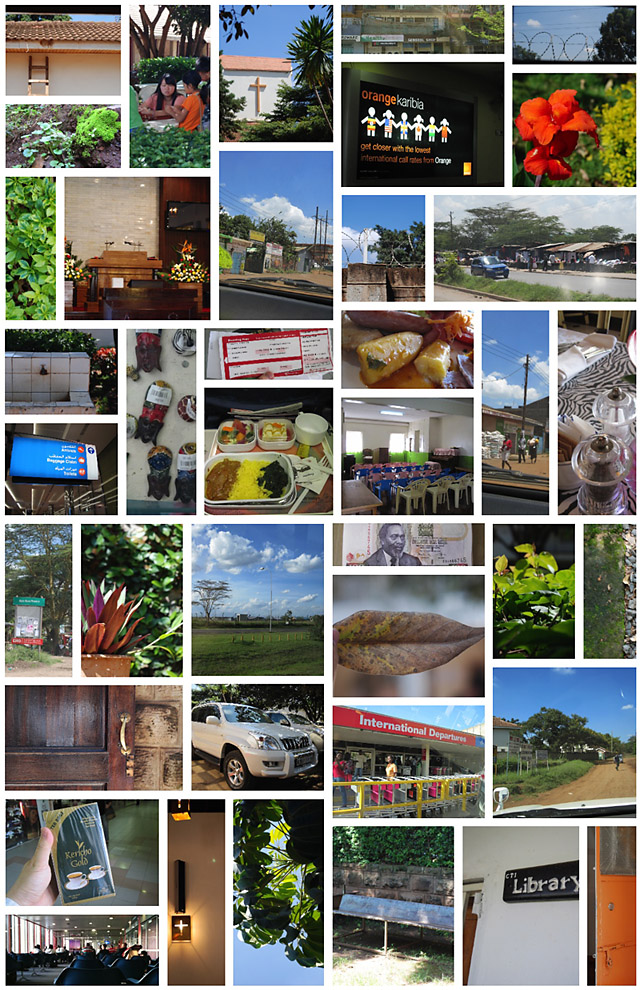
Views from Kenya, composed using Posterino.

Views from Washington DC, composed using Posterino
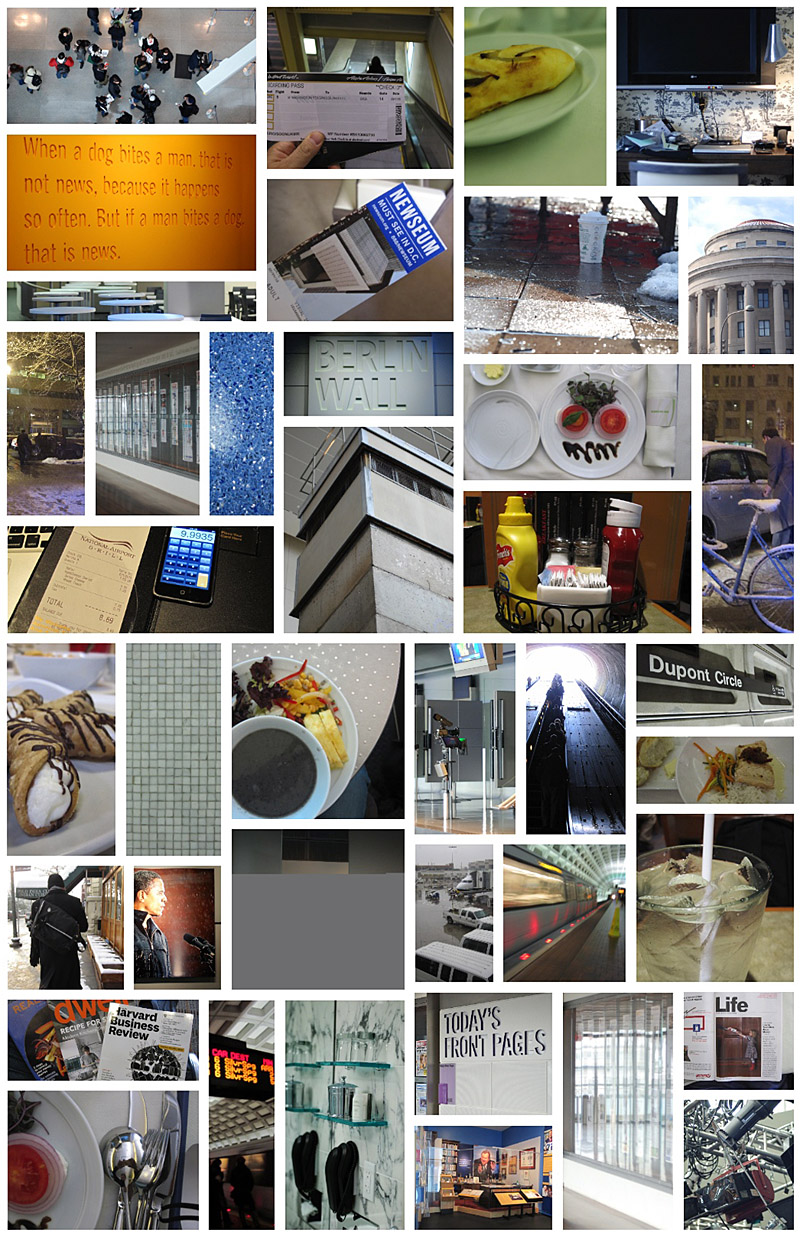
People need places to meet.
Chairs or sofa are often needed if they intend to take some time to share stories.
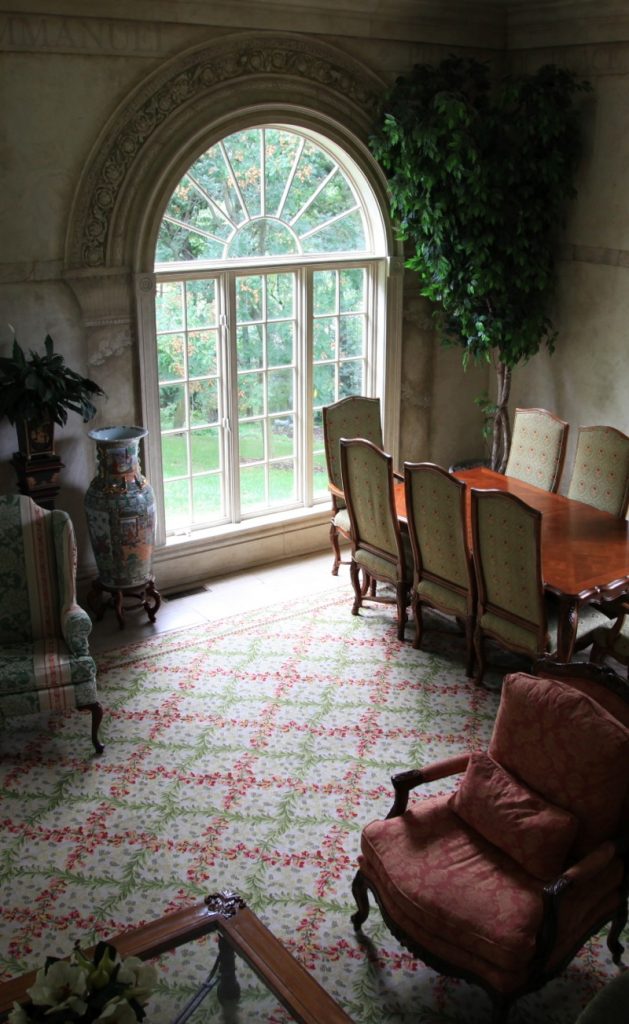
And when they meet, they usually have some kind of drink or meal together. So a small kitchen would help.

When the surrounding atmosphere is like a home, it can help you feel cozy, snug and comfortable.
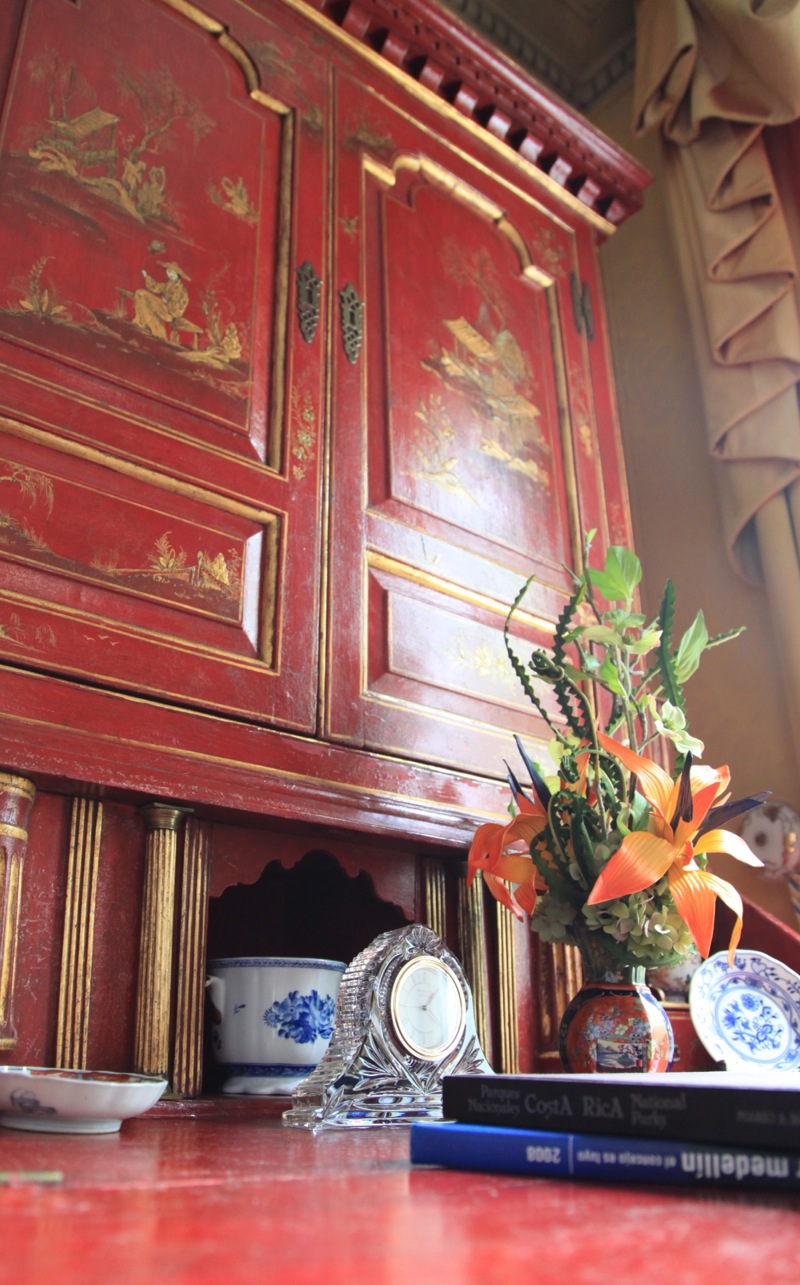
It takes quite a deal of workforce to run and maintain this kind of facility for meeting. Perhaps that is how prices of coffee sold in some cafes(*) can be justified.
* Medium-sized Latte at Coffee Bean and Tea Leaf: 4,500 Won
* Tall-sized Latte at Starbucks: 4,100 Won
On the other hand, if you are buying a cup of coffee to enjoy on the go from such places and still pay the full price, you might be paying to much.
* Photos are from my visit to a guest house in Washington DC in 2010.
For some while, I kept thinking of how I can capture images that represents Korea in a sensible way. I first thought of traditional patterns and shapes seen in old buildings, folk costumes, stone walls, and furniture. But then not only those images have been amply covered already, most of them were so out of ordinary living scape that it seemed quite unrealistic.
Then I thought of more modern counterparts. For example, the views of locations recently developed, trendy shops, heavy traffic areas, etc. While those scenes were more realistic and more representative of everyday lives in Korea, the problem was that quite a portion of those scenes were end-products of designers and architects trying to somewhat mimic what they saw in US, Japan, and Europe.
It occurred to me only recently that the most interesting part of any scene or experience must be in the people who occupy the space. So I should make it my start point to observe the behavioral patterns exhibited by people in Korea and juxtapose it with the environmental elements.
There is a saying that goes “You can’t teach an old dog new tricks.” It often means that it is difficult to make people adopt a new set of skills or change their way of life when they have grown accustomed to certain patterns of doing things, or when they have aged too much.
Now I wonder if one’s age could really be a good excuse for not learning new “tricks”. Perhaps the adage could be applied to real dogs, which I cannot be really sure since I haven’t lived long with dogs. But for human beings like those who are reading this blog, I doubt the validity of the claim or assumption embedded in this saying.
Thus I wonder:
I sometimes observe that it is older people who have more time on their hands if not more money. Perhaps it is with that excess time that older people can be expected to accumulate more knowledge and new skills.
Life can quickly go stale if you neglect to maintain it properly. Make it a habit to keep it updated every now and then. Expose yourself to new challenges. Stop making excuses for not learning anything new.
So here are some practical applications:
업무량이 많은 건지 일을 하는 요령이 부족한 건지, 나는 주로 혼자 남아 야근을 하는 경향이 많다.
문제는 혼자서 밥을 먹는 데서 어려움이 발생한다는 것. 한 명이나 두 명이나 반찬은 똑같이 나오는데 혼자 밥상 차지하고 먹는 것도 장사하는 사람에게 미안하고 나이가 들수록 혼자 밥먹는 것도 재미가 없어진다. 같이 밥먹을 사람이 있으면 좋겠지만 미리 약속도 안 잡았는데 밥먹고 다시 들어가 일해야 하는 상황에서 누군가를 불러내기도 어렵다.
한편, 어떤 문제에 대한 원인은 십중팔구 자기 자신에게 있을 것이라고 보는 ‘너, 외롭구나’의 저자 김형태 님의 관점으로 본다면 오죽 재미없는 인간이기에, 오죽 인간관계지수가 낮길래 저녁에 불러주는 사람도, 불러낼 사람도 없이 혼자 밥을 먹어야 하는 쓸쓸한 중년 아저씨가 되어버렸는가 하고 스스로를 탓해야 하는지도 모르겠다.
퇴근 시간에 맞추어 일을 어쨌든 정리하고 일찍 집에 들어가 가족과 식사를 할 수 있다면 이런 문제를 모두 해결할 수 있으련만.
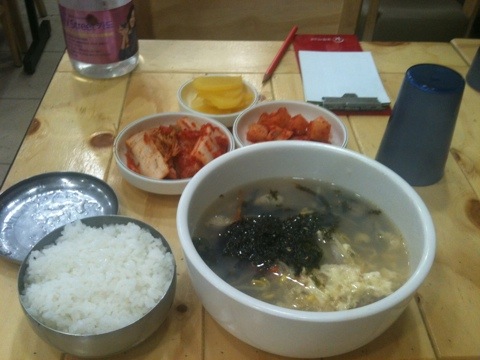
사진은 여의도역 사거리 아일렉스빌딩 지하 꼬투리김밥에서 혼자 먹는 6000원짜리 굴해장국. 주의사항: (1) 청양고추가 들어가서 국물이 맵다 (2) 신선한 굴을 기대하지 말 것]]>
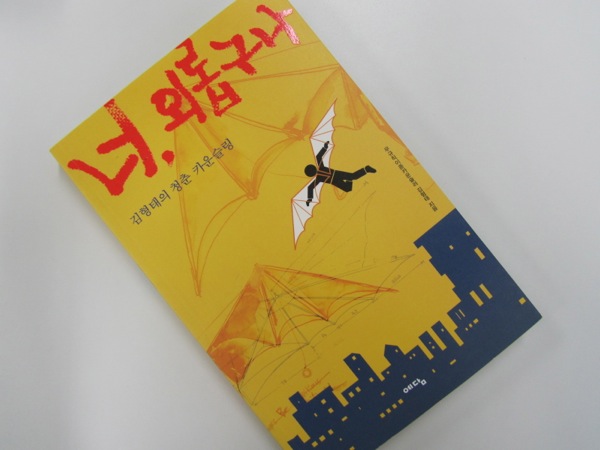
어떤 계기로 이 책을 읽게 되었는지는 도무지 기억이 나지 않는다. 잘 모르는 저자인데다가 제목이 내 취향과 전혀 맞지 않기에 누군가의 추천 없이는 이 책을 스스로 골랐을 가능성은 거의 없다. 그런데 누구가 이 책을 추천해 주었는지 생각나지 않는 것이다.
어떤 계기로 읽게 되었건 김형태 저, ‘너, 외롭구나‘ (예담)는 나에게는 매우 충격적이었고 2006-2007년경 당시 근무했던 회사 직원 모두에게 한 권씩 선물한 드문 사례를 남긴 책이 되었다. 젊은 시절의 고민을 가진 이들의 이야기를 들어주고 이에 대한 조언을 꽤 직선적으로 제시해 줬다는 점이 이 책의 특징이다.
고민을 가진 사람의 형편에 공감하고 동정하다보면 꼭 필요한 말을 사실대로 이야기해주기 보다는 돌려서 이야기하거나 좋은 말로 위로하는 데에서 그치기 쉬운데 저자인 김형태씨는 읽는 사람이 아찔할 정도로 직선적으로 이야기를 한다. 마치 눈다래끼가 나서 안과에 가면 의사 선생님이 ‘가만 두면 안 되겠네요. 조금 아플 거예요’ 하면서 다짜고짜 손가락으로 눌러 고름을 짜내는 것과 비슷하다. (물론 마취한다고 주사를 놓기는 하는데 그래도 아프다.)
“이유를 알고 싶다고 쓰셨네요. 이유를, 사실대로 말씀드리죠. 당신이 나이가 많고 빽이 없고 운이 없어서가 아니라, 실력이 부족하기 때문입니다. 당신 생각엔 당신의 실력이 남들과 다를 바 없어 보일지 모릅니다. 하지만 그것은 순전히 당신만의 생각일 뿐입니다. (중략) 당신이 입사 시험에서 떨어진 이유는, 실력이 부족해서 입니다. 그 외에 다른 이유는 달지 마십시오. 푸념도, 비관도 과대망상입니다. 그 시간에 자신을 더 객관적으로 바라보고, 결점들을 고쳐 나가고 미비한 점들을 보완하십시오.”
– 김형태 저, ‘너, 외롭구나’, 예담(108-112쪽)
말주변이 없어 고민이라는 문제로 조언을 구한 경우의 예. (아래 사진) 예전에 내가 비슷한 문제로 고민할 때 주변에서 해준 이야기는 “괜찮다. 그런 거 걱정할 필요 없다. 꼭 필요한 말만 하면 된다” 라는 논지의 위로와 격려였다.
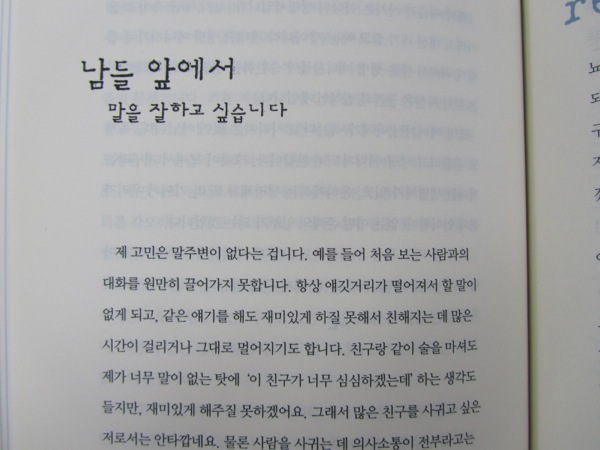
김형태 저, ‘너, 외롭구나’, 예담(224쪽) 그러나 김형태씨는 말주변이 없다는 것은 사실은 생각이 없다는 이야기이며 이는 취직이 안되는 문제로 이어질 수 있는 등 아주 심각한 문제이므로 어떻게 해서든 고쳐야만 한다고 경각심을 일깨워주는 이야기를 해준다. (아래 사진)
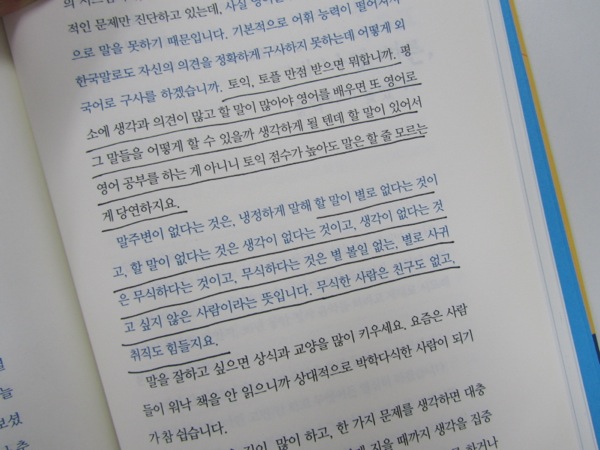
김형태 저, ‘너, 외롭구나’, 예담(227쪽) 상담을 요청한 입장에서는 이런 말을 들으면 무안할 수도 있지만 세상 살아가는 현실이 그리 쉽지만은 않은 상황에서 이런저런 고민에 눌려 주눅들어 있기 보다는 정신을 바짝 차리고 주도적으로 상황을 개선해 나갈 용기와 위기의식을 불러 일으키는 것이 오히려 당사자에게 도움이 될 것이라는 느낌을 받았다.
그러나 또 다른 관점에서 이 책이 인상 깊었던 것은 어쨌거나 저자는 고민을 가진 청년들의 이야기를 들어주고 대화의 상대가 되어 주었다는 점이다. 고민에 빠져있는 사람은 고독해지기 마련인데 그런 이들을 위해 대화 상대가 되어줌으로써 적어도 그들의 고독감의 일부분을 풀어주는데 기여했으리라 생각한다.
서울대 김난도 교수의 저서 ‘아프니까 청춘이다‘를 읽었다.
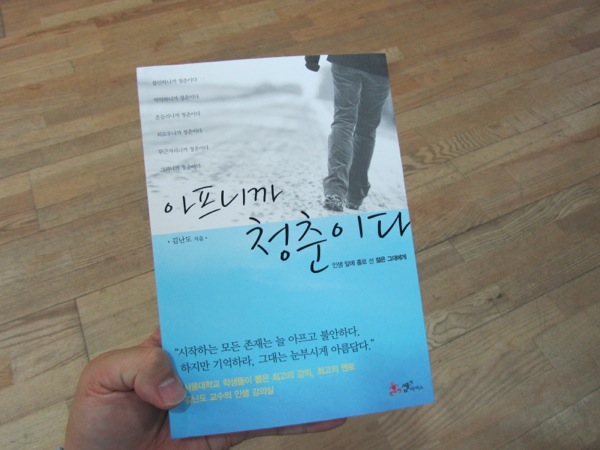
다른 것 보다 6개월만에 320쇄를 찍었다는 것을 보고 깜짝 놀랐다. 어떻게 이럴수가.
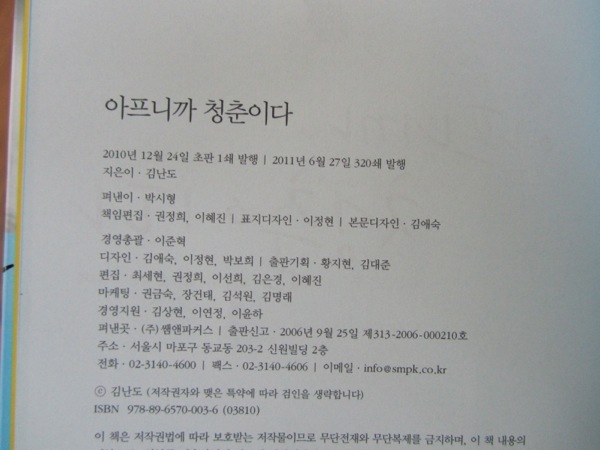
책을 읽고 한 가지라도 마음에 도전을 주거나 사고방식을 바꿔놓는 교훈을 얻는다면 충분한 가치를 건진 것이라고 생각한다. 책 내용 중 “시골의사” 박경철씨의 인터뷰 내용을 인용한 부분이 무척 인상 깊었다. 나는 여기에서 말하는 ‘다섯 가지’를 다 안 하는데 왜 이렇게 시간이 부족한 걸까?
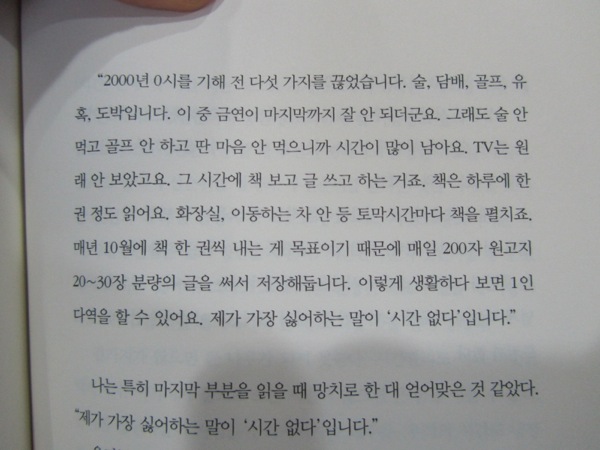
어쨌거나 이런 류의 책을 대하는 태도의 핵심은 누군가의 조언에 귀를 기울일 수 있는 겸손함을 가져야 한다는 것. “다 필요 없어요. 나 다 알아요.”라는 태도를 가지고 있으면 새로운 것을 배우기가 쉽지 않다. “대학 교수가 하는 말이 뻔하지 뭐”라는 삐딱한 생각으로 무조건 배척하기 보다는 배울 점이 있으면 배우고 아니다 싶으면 넘어가면 된다.
“미련한 자는 자기 행위를 바른 줄로 여기나 지혜로운 자는 권고를 듣느니라”
– 잠언 12:15
*(연관도서) 김형태 저 ‘너 외롭구나‘도 추천한다. 누군가가 김어준 저 ‘건투를 빈다’를 권했다. 그것도 읽어봐야지.]]>